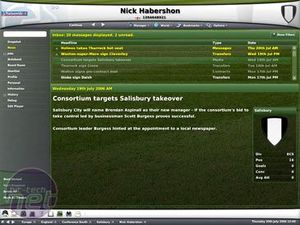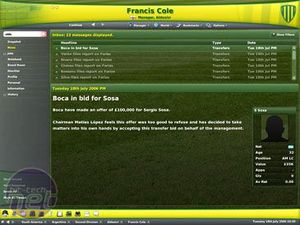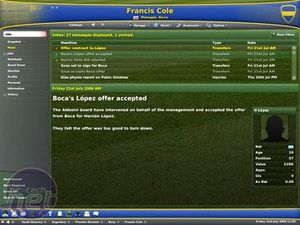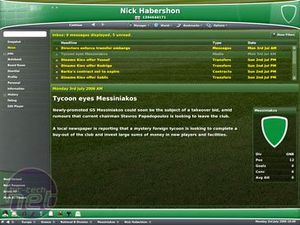It’s un-surprising that one of the most popular gaming franchises in the UK is based around football management. Every fan of the passionate game has their own theories, philosophies and hunches on what their team's best side would be and how they should be playing the game. Every supporter is a manager at heart and any game that taps into this desire is bound to succeed.
What is surprising, however, is that the game which does football management best is structured by the rather impassionate manipulation of databases and spreadsheets. For over a decade now, football fans have flocked in droves to pick up the yearly update of Football Manger (previously Championship Manager), but the question is - why? Every year Sports Interactive takes the game, adds a few small features, adds a year on all the players ages and then tweaks the interface. That is it – no more, no less. Nobody complains, nobody demands for an overhaul, nobody screams the developers are being lazy and resting on their laurels. Sports Interactive essentially make exactly the same game year in year out and we lap it up. Why?
The answer is an age old cliché (and one commonly used in football coincidentally): “If it ain’t broke, don’t fix it.” That phrase essentially sums up Football Manager. The basic formula works now as well as it did 10 years ago. You take control of any team you like from a choice of hundreds (as low as the Vauxhall North/South divisions in England) and your task is to fulfil the hopes of the board and supporters and maybe win a few trophies along the way. You buy and sell players and staff based on their in-game stats, you work out the most suitable tactic and then you launch simulated games which you have no direct control over to see if your plan worked. Since the first Championship Manager these have been the ingredients, and the resulting product has always been far tastier than any other football management game.
Football Manager 2007's primary success is its ability to feel real. The most important factor to all of the games in the series is that results never appear too random. Sure, you get a few dodgy scores, but by and by the better teams win games. I took control of Barnet and began the season by losing the first three games. Worried I may lose my job as the Barnet supremo, I studied the previous matches to see what exactly had gone wrong. A short bit of statistical analysis later and I’d narrowed the problem down to the fact that my wingers weren’t getting the ball enough and that my centre back had a female's positional sense, less influence than Kevin Federline and (I believe though have not confirmed) shared Heather Mills affliction in lacking a leg.
A quick change of tactics, forcing my players to look for wide options, and a loan of a centre back who can actually play football and my fortunes changed. I didn’t start winning every game 10-0 all of a sudden but I managed to grab a 1-1 draw in the League Cup with local rivals Queens Park Rangers. I assessed the situation, came up with an idea for changing things and I saw a noticeable difference in my team.
It is the feeling of complete control in Football Manager that really allows you to enjoy your triumphs. When you win against the odds you know it is down to your own managerial brilliance. The element of control is not located solely in your decision over the formation. Training your players and hiring the best coaches to do it also has a noticeable affect. You can even set up your own training schedules that will actually help shape the way your team plays. Fancy yourself as a bit of a Sam Allardyce? Then allocate more training time to set-pieces – providing you don’t have a team of pigmies you’ll be scoring from corners and free-kicks in no time.
What I have described so far is essentially the Football Manager experience many of you will know and love from previous versions of the game. The new features, despite being fairly small and subtle, do make for a more enjoyable, immersive and realistic experience. In the previous game the ability to wind up rival managers was added, by taunting a manager and telling him his team was a load of cack – you’d find his playing style might have changed, he’d become more aggressive allowing you to maybe capitalise on the counter-attack in your next game.
What is surprising, however, is that the game which does football management best is structured by the rather impassionate manipulation of databases and spreadsheets. For over a decade now, football fans have flocked in droves to pick up the yearly update of Football Manger (previously Championship Manager), but the question is - why? Every year Sports Interactive takes the game, adds a few small features, adds a year on all the players ages and then tweaks the interface. That is it – no more, no less. Nobody complains, nobody demands for an overhaul, nobody screams the developers are being lazy and resting on their laurels. Sports Interactive essentially make exactly the same game year in year out and we lap it up. Why?
The answer is an age old cliché (and one commonly used in football coincidentally): “If it ain’t broke, don’t fix it.” That phrase essentially sums up Football Manager. The basic formula works now as well as it did 10 years ago. You take control of any team you like from a choice of hundreds (as low as the Vauxhall North/South divisions in England) and your task is to fulfil the hopes of the board and supporters and maybe win a few trophies along the way. You buy and sell players and staff based on their in-game stats, you work out the most suitable tactic and then you launch simulated games which you have no direct control over to see if your plan worked. Since the first Championship Manager these have been the ingredients, and the resulting product has always been far tastier than any other football management game.
Football Manager 2007's primary success is its ability to feel real. The most important factor to all of the games in the series is that results never appear too random. Sure, you get a few dodgy scores, but by and by the better teams win games. I took control of Barnet and began the season by losing the first three games. Worried I may lose my job as the Barnet supremo, I studied the previous matches to see what exactly had gone wrong. A short bit of statistical analysis later and I’d narrowed the problem down to the fact that my wingers weren’t getting the ball enough and that my centre back had a female's positional sense, less influence than Kevin Federline and (I believe though have not confirmed) shared Heather Mills affliction in lacking a leg.
A quick change of tactics, forcing my players to look for wide options, and a loan of a centre back who can actually play football and my fortunes changed. I didn’t start winning every game 10-0 all of a sudden but I managed to grab a 1-1 draw in the League Cup with local rivals Queens Park Rangers. I assessed the situation, came up with an idea for changing things and I saw a noticeable difference in my team.
It is the feeling of complete control in Football Manager that really allows you to enjoy your triumphs. When you win against the odds you know it is down to your own managerial brilliance. The element of control is not located solely in your decision over the formation. Training your players and hiring the best coaches to do it also has a noticeable affect. You can even set up your own training schedules that will actually help shape the way your team plays. Fancy yourself as a bit of a Sam Allardyce? Then allocate more training time to set-pieces – providing you don’t have a team of pigmies you’ll be scoring from corners and free-kicks in no time.
What I have described so far is essentially the Football Manager experience many of you will know and love from previous versions of the game. The new features, despite being fairly small and subtle, do make for a more enjoyable, immersive and realistic experience. In the previous game the ability to wind up rival managers was added, by taunting a manager and telling him his team was a load of cack – you’d find his playing style might have changed, he’d become more aggressive allowing you to maybe capitalise on the counter-attack in your next game.

MSI MPG Velox 100R Chassis Review
October 14 2021 | 15:04














Want to comment? Please log in.